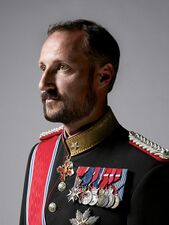Not to be confused with the Madrilene Empire, which is commonly incorrectly referred to as the Holy Roman Empire.
The Holy Roman Empire, formally and legally described simply as the Roman Empire, is a polity and super-national organisation in the northern and eastern Doggerlands. According to the Pontifical Church, the Holy Roman Empire is the true successor state of Rome, making it the final empire. Governed by the Holy Roman Emperor, on the concept of translatio imperii, the Holy Roman Empire is widely considered to be the home of Christendom on Terra.
On 1 January 3025, Pontifex Konstantin IX crowned Balancín monarch Maximilian II as Roman emperor, reviving the title in Western Europe more than 1,200 years since its last recognised use. Maximilian was crowned Emperor Maximilian Augustus, forming the Empire in the Doggerlands as a union between the Balancín Kingdoms, the Pontifical States, and the Grand Duchy of Zaandam.
The Empire is an elective monarchy, being selected by the electoral college. In theory and diplomacy, the emperor is considered first among equals of all Catholic monarchs. Though in practice, the title and office grants the emperor significantly more influence. Maximilian Augustus's coronation cemented his position as the most powerful monarch, and among the most powerful individuals, in the Doggerlands.
Holy Roman Emperor
The Holy Roman Emperor, officially the Emperor of the Romans (Latin: Imperator Romanorum) is the ruler and head of state of the Holy Roman Empire. The title is held in conjunction with the title King of the Rock, owing to the personal union between the Balancín Crown and the Imperium (the office of the Emperor).
The title of Emperor provides the highest prestige among Catholic monarchs, because the empire is considered by the Pontifical Church to be the only successor of the Roman Empire during the Middle Ages and the early modern period. Thus, in theory and diplomacy, the Emperor is considered primus inter pares (first among equals). The Emperor rules by divine right, being crowned by the Bishop of Rome and Ecclesia (the Pontifex). The Holy Roman Emperor is considered to be the official defender of the Pontifical faith.
Elections for the office of Holy Roman Emperor can be called by the Pontifex or the Emperor themselves. In the instances where the Pontifex calls for an Imperial election, the office is vacant after the death or abdication of the previous Emperor. In the instances where the Emperor calls the election himself, it is usually an attempt to select an heir prior to their death. The elected Emperor, if the previous Emperor is still reigning, takes the title King of the Romans.
Full style
Since the coronation of Maximilian Augustus, the official style of the Emperor has been: His Imperial Grace, the Emperor of the Romans. During his coronation, Maximilian Augustus's full titles was read:
Maximilian, by the Grace of God, most serene Augustus, great and pacific Emperor, governing the Roman Empire, King of the Rock and of the Newton, of Bonitana, of Shipley, of Romania, King of Jerusalem, Lord of the Balancín Kingdoms, Lord Protector of Zaandam, Lord Protector of Asturias, Obragon, and Shore, Defender of the Faith and His Most Catholic Majesty, Captain General of the Holy Pontifical Church, Lord High Sovereign and Majestic Crusader of the Order of the Knights Templar.
List of emperors
This list shall document all monarchs crowned since Maximilian Augustus in 3024. For a list of previous Emperors of the Romans, see here.
| Portrait | Name
Lifespan |
Reign began | Reign ended | Elected | Relationship with predecessor(s) | Other title(s) |
|---|---|---|---|---|---|---|
 |
Maximilian Augustus, the Crusader
(2978-present) |
1 January 3025 | present | None | None |
|
